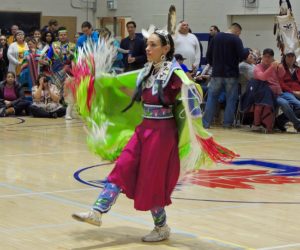First University of Toronto community Powwow revival deemed ‘a needed cultural shift’

By Christine Smith McFarlane
TORONTO—The Indigenous Studies Students’ Union hosted the Honouring Our Students Powwow, the first powwow held at the University of Toronto in 20 years, on March 11, drawing over 600 people in attendance.
“Students were coming to the ISSU asking for their own powwow,” stated Jennifer Sylvester, President and Communications Coordinator of the Indigenous Studies Students Union (ISSU) and a student at the University of Toronto (U of T). “The surrounding colleges and Universities had their own powwow and ISSU executives agreed that we wanted a powwow to happen for University of Toronto Indigenous students also.”
“The grassroots work for the powwow started last summer, but the official planning committee formed in later October 2016,” continued Sylvester. “Many of the people knew what a powwow could do for a community; however we could never have imagined the amount of success and interest Honouring Our Students garnered. It was heartwarmingly amazing.”
With the many diverse Indigenous nations represented at U of T, the course union within the Arts and Science Students’ Union at U of T presented many of these nations through their powwow programming. This meant that there was Aztec dancing, Inuit drumming and throat singing, hoop dancing and various other dances that truly got everyone involved. The great energy was palpable throughout the day.
There were two lead dancers, a male and female, for the powwow. Male Lead dancer was Buck Neshkiwe, a proud member of Wikwemikong Unceded First Nation and a student who began Grass Dancing in traditional powwows two years ago when his cousin gifted him with grass dance regalia. The female lead dancer was Nichole Leveck, a proud Wyandot/ Scottish woman who started dancing in 2007 at the Native Canadian Centre (NCCT) dance classes and has been dancing ever since.
“I was asked to be head male dancer in mid-January 2017 and then I agreed to pull in the vendors we needed because I know a lot of our economic warriors personally from being an active part of our urban powwow community,” shared Neshkiwe. “I went to the Native Canadian Centre’s Valentine’s craft sale in February and hand-picked some really great vendors and brought them on board.”
“I also asked a few food vendors and a coffee vendor too,” continued Neshkiwe. “It was an honour to help out that way and on the morning of the powwow when the vendors were setting up I helped to make sure they were properly organized. It was a lot of work, but it was great and I really enjoyed myself and then being able to dance the day away afterward was so great. And a lot of them have asked for me to get in touch for next year’s powwow.
Because of the overwhelming success of the inaugural powwow, there is hope that it is an event that will continue on for years to come.
“Overall, thanks to my academic supports and new people I met this year…I hope there is [a] powwow next year and even if I am not head male dancer, I will gladly come and dance my style in my university that is working hard to answer the calls to the TRC report to include Indigenous history and knowledge throughout the university.”
Special guests who were also in attendance included: Regional Chief Isadore Day; Chief Stacy LaForme of the Mississaugas of the New Credit First Nations; Federal Minister of Indigenous and Northern Affairs Dr. Carolyn Bennett; Ministry of Indigenous Relations and Reconciliation Deputy Minister Deborah Richardson Goulais; Founder of Indspire John Kim Bell; Jonathan Hamilton Diabo; and faculty from the various colleges across the St. George Campus.
“When we were planning Honouring Our Students Powwow, we planned it for the purpose of this being the inaugural powwow of a yearly event,” explained Sylvester. “Something the University of Toronto community can take pride in for many generations. The success of this event has proven the Indigenous students and the University of Toronto community were craving a cultural shift. Honouring Our Students Powwow will fill that need each and every year.”


